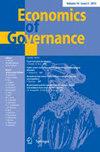2017 年伊朗总统选举中的博尔达悖论:来自民意调查的经验证据
IF 0.8
4区 经济学
Q3 ECONOMICS
引用次数: 0
摘要
社会选择理论家们提出的各种投票悖论在现实世界的选举中鲜有记录。在2017年伊朗总统选举中收集到的民意调查数据提供了大量实证证据,表明在竞选期间出现了强博尔达悖论(康德塞特输家赢得多数票)和弱博尔达悖论(非康德塞特赢家的替代者赢得多数票)。同时,没有证据表明存在康德塞特悖论,即前三名候选人之间的循环。这些结果支持了社会选择理论悖论的实证相关性,并呼吁投票程序的重要性。本文章由计算机程序翻译,如有差异,请以英文原文为准。
Borda paradox in the 2017 Iranian presidential election: empirical evidence from opinion polls
Different voting paradoxes identified by social choice theorists have rarely been documented in real-world elections. The collected data from the opinion polls in the 2017 Iranian presidential election provides substantial empirical evidence indicating that during the electoral campaigns, strong Borda paradox (the Condorcet loser wins plurality.) and weak Borda paradox (An alternative that is not the Condorcet winner wins plurality.) have occurred. At the same time, there was no evidence of a Condorcet paradox, i.e., a cycle among the top three candidates. The results support the empirical relevance of theoretical paradoxes in social choice and a call for the importance of voting procedures.
求助全文
通过发布文献求助,成功后即可免费获取论文全文。
去求助
来源期刊

Economics of Governance
ECONOMICS-
CiteScore
1.50
自引率
0.00%
发文量
22
期刊介绍:
Economics of Governance aims to foster research on governance at many levels: corporations, non-profit organizations, local and federal governments, and international organizations. Applications include the internal organization of firms, corporate governance, the private provision of public goods, local public policies, relations across levels of government, public expenditure and regulation, and problems of credibility and enforcement of international agreements. Though the journal aims to contribute to general economic knowledge, it is also interested in applying theoretical and empirical insights to important current topics. The journal is open to many approaches, including formal theoretical analysis, systematic observation, simulation, and empirical studies. Interdisciplinary contributions by economists, organizational scholars, and political scientists are encouraged.
Officially cited as: Econ Gov
 求助内容:
求助内容: 应助结果提醒方式:
应助结果提醒方式:


